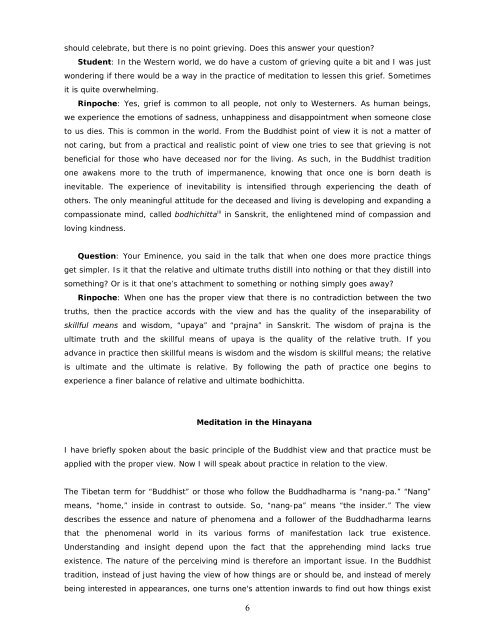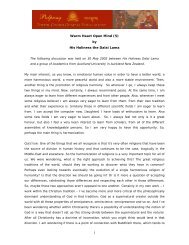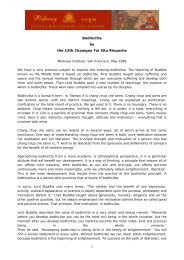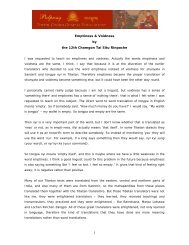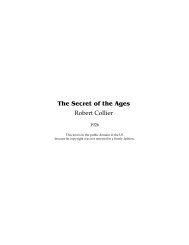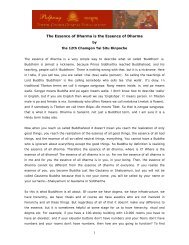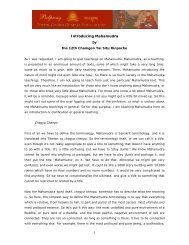1 The Essential Teachings of the Buddhadharma
1 The Essential Teachings of the Buddhadharma
1 The Essential Teachings of the Buddhadharma
- No tags were found...
Create successful ePaper yourself
Turn your PDF publications into a flip-book with our unique Google optimized e-Paper software.
should celebrate, but <strong>the</strong>re is no point grieving. Does this answer your question?Student: In <strong>the</strong> Western world, we do have a custom <strong>of</strong> grieving quite a bit and I was justwondering if <strong>the</strong>re would be a way in <strong>the</strong> practice <strong>of</strong> meditation to lessen this grief. Sometimesit is quite overwhelming.Rinpoche: Yes, grief is common to all people, not only to Westerners. As human beings,we experience <strong>the</strong> emotions <strong>of</strong> sadness, unhappiness and disappointment when someone closeto us dies. This is common in <strong>the</strong> world. From <strong>the</strong> Buddhist point <strong>of</strong> view it is not a matter <strong>of</strong>not caring, but from a practical and realistic point <strong>of</strong> view one tries to see that grieving is notbeneficial for those who have deceased nor for <strong>the</strong> living. As such, in <strong>the</strong> Buddhist traditionone awakens more to <strong>the</strong> truth <strong>of</strong> impermanence, knowing that once one is born death isinevitable. <strong>The</strong> experience <strong>of</strong> inevitability is intensified through experiencing <strong>the</strong> death <strong>of</strong>o<strong>the</strong>rs. <strong>The</strong> only meaningful attitude for <strong>the</strong> deceased and living is developing and expanding acompassionate mind, called bodhichitta iii in Sanskrit, <strong>the</strong> enlightened mind <strong>of</strong> compassion andloving kindness.Question: Your Eminence, you said in <strong>the</strong> talk that when one does more practice thingsget simpler. Is it that <strong>the</strong> relative and ultimate truths distill into nothing or that <strong>the</strong>y distill intosomething? Or is it that one’s attachment to something or nothing simply goes away?Rinpoche: When one has <strong>the</strong> proper view that <strong>the</strong>re is no contradiction between <strong>the</strong> twotruths, <strong>the</strong>n <strong>the</strong> practice accords with <strong>the</strong> view and has <strong>the</strong> quality <strong>of</strong> <strong>the</strong> inseparability <strong>of</strong>skillful means and wisdom, “upaya” and “prajna” in Sanskrit. <strong>The</strong> wisdom <strong>of</strong> prajna is <strong>the</strong>ultimate truth and <strong>the</strong> skillful means <strong>of</strong> upaya is <strong>the</strong> quality <strong>of</strong> <strong>the</strong> relative truth. If youadvance in practice <strong>the</strong>n skillful means is wisdom and <strong>the</strong> wisdom is skillful means; <strong>the</strong> relativeis ultimate and <strong>the</strong> ultimate is relative. By following <strong>the</strong> path <strong>of</strong> practice one begins toexperience a finer balance <strong>of</strong> relative and ultimate bodhichitta.Meditation in <strong>the</strong> HinayanaI have briefly spoken about <strong>the</strong> basic principle <strong>of</strong> <strong>the</strong> Buddhist view and that practice must beapplied with <strong>the</strong> proper view. Now I will speak about practice in relation to <strong>the</strong> view.<strong>The</strong> Tibetan term for “Buddhist” or those who follow <strong>the</strong> <strong>Buddhadharma</strong> is “nang-pa.” “Nang”means, “home,” inside in contrast to outside. So, “nang-pa” means “<strong>the</strong> insider.” <strong>The</strong> viewdescribes <strong>the</strong> essence and nature <strong>of</strong> phenomena and a follower <strong>of</strong> <strong>the</strong> <strong>Buddhadharma</strong> learnsthat <strong>the</strong> phenomenal world in its various forms <strong>of</strong> manifestation lack true existence.Understanding and insight depend upon <strong>the</strong> fact that <strong>the</strong> apprehending mind lacks trueexistence. <strong>The</strong> nature <strong>of</strong> <strong>the</strong> perceiving mind is <strong>the</strong>refore an important issue. In <strong>the</strong> Buddhisttradition, instead <strong>of</strong> just having <strong>the</strong> view <strong>of</strong> how things are or should be, and instead <strong>of</strong> merelybeing interested in appearances, one turns one's attention inwards to find out how things exist6


